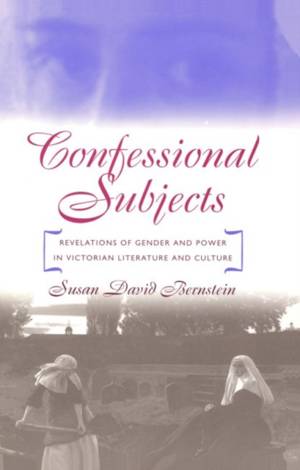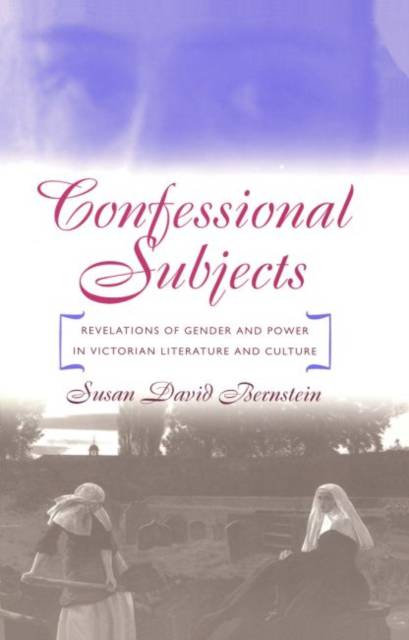
- Afhalen na 1 uur in een winkel met voorraad
- Gratis thuislevering in België vanaf € 30
- Ruim aanbod met 7 miljoen producten
- Afhalen na 1 uur in een winkel met voorraad
- Gratis thuislevering in België vanaf € 30
- Ruim aanbod met 7 miljoen producten
Zoeken
Confessional Subjects
Revelations of Gender and Power in Victorian Literature and Culture
Susan David Bernstein
€ 76,45
+ 152 punten
Omschrijving
Susan Bernstein examines the gendered power relationships embedded in confessional literature of the Victorian period. Exploring this dynamic in Charlotte Bronta's Villette, Mary Elizabeth Braddon's Lady Audley's Secret, George Eliot's Daniel Deronda, and Thomas Hardy's Tess of the d'Urbervilles, she argues that although women's disclosures to male confessors repeatedly depict wrongdoing committed against them, they themselves are viewed as the transgressors. Bernstein emphasizes the secularization of confession, but she also places these narratives within the context of the anti-Catholic tract literature of the time. Based on cultural criticism, poststructuralism, and feminist theory, Bernstein's analysis constitutes a reassessment of Freud's and Foucault's theories of confession. In addition, her study of the anti-Catholic propaganda of the mid-nineteenth century and its portrayal of confession provides historical background to the meaning of domestic confessions in the literature of the second half of the century.
Originally published in 1997.
A UNC Press Enduring Edition -- UNC Press Enduring Editions use the latest in digital technology to make available again books from our distinguished backlist that were previously out of print. These editions are published unaltered from the original, and are presented in affordable paperback formats, bringing readers both historical and cultural value.
Originally published in 1997.
A UNC Press Enduring Edition -- UNC Press Enduring Editions use the latest in digital technology to make available again books from our distinguished backlist that were previously out of print. These editions are published unaltered from the original, and are presented in affordable paperback formats, bringing readers both historical and cultural value.
Specificaties
Betrokkenen
- Auteur(s):
- Uitgeverij:
Inhoud
- Aantal bladzijden:
- 224
- Taal:
- Engels
- Reeks:
Eigenschappen
- Productcode (EAN):
- 9780807846247
- Verschijningsdatum:
- 10/03/1997
- Uitvoering:
- Paperback
- Formaat:
- Trade paperback (VS)
- Afmetingen:
- 157 mm x 236 mm
- Gewicht:
- 358 g

Alleen bij Standaard Boekhandel
+ 152 punten op je klantenkaart van Standaard Boekhandel
Beoordelingen
We publiceren alleen reviews die voldoen aan de voorwaarden voor reviews. Bekijk onze voorwaarden voor reviews.











